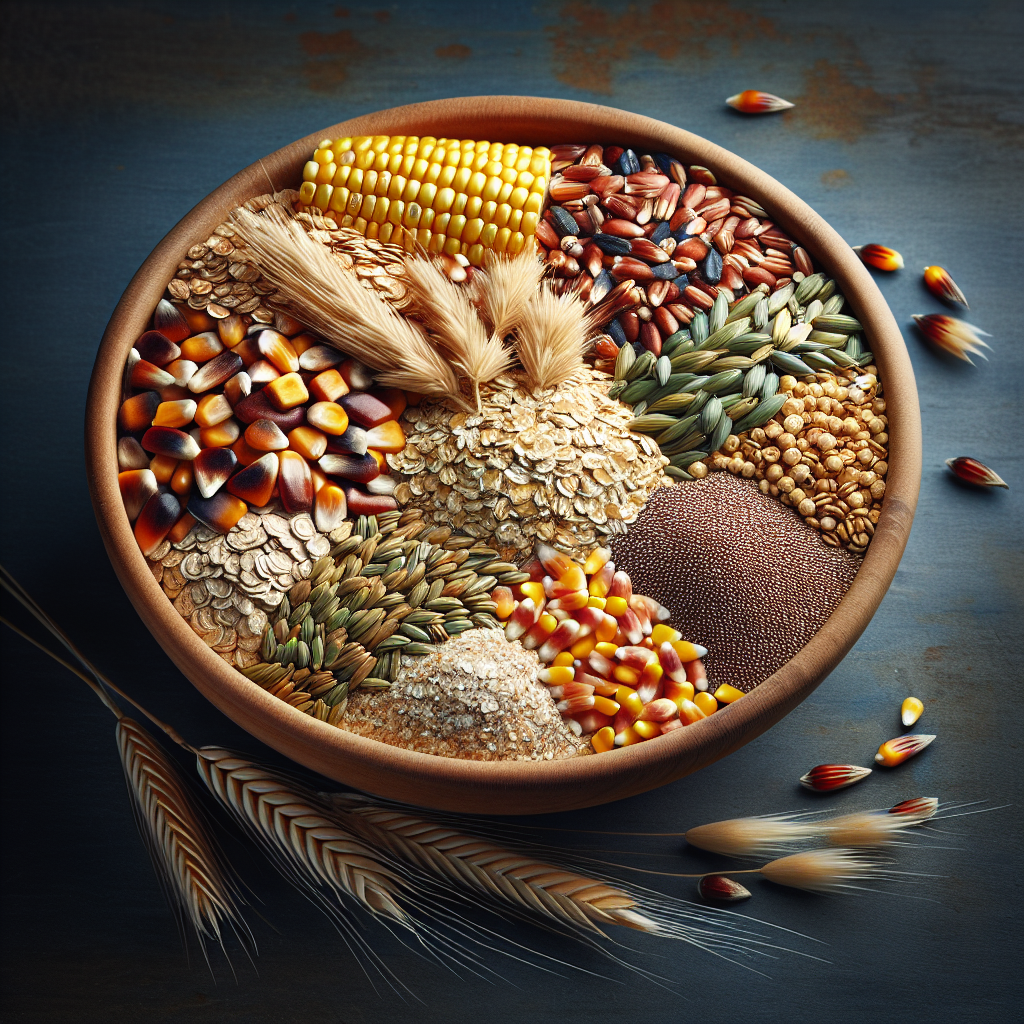During molting or periods of stress, it’s important to provide your pets with the right nutrition to support their overall health and well-being. But have you ever wondered if there are specific feed ingredients that can be particularly beneficial during these times? In this article, we will explore the potential benefits of certain feed ingredients during molting or stress periods, giving you valuable insights to help you make informed choices for your beloved pets. So, let’s dive right in and discover the key ingredients that could make a significant difference in their overall health and happiness.
Understanding Molting and Stress Periods
What is molting in animals?
Molting is the natural process of shedding and regrowing feathers or fur in animals. It is a vital part of their life cycle and occurs regularly in many species. During molting, old, damaged, or worn-out feathers are replaced with new ones, ensuring optimal insulation, flight, and protection for the animal.
Causes of stress periods in animals
Stress periods in animals can be triggered by various factors, including environmental changes, predator threats, social interactions, nutritional deficiencies, illness, or injury. These stressors can disrupt the normal functioning of an animal’s body, leading to physiological and behavioral changes.
Impact of molting and stress on animals
Both molting and stress periods can have significant implications for the overall health and well-being of animals. Molting requires substantial energy and nutrients, and if an animal is under stress during this period, it can lead to reduced feather quality, delayed feather regrowth, and compromised immune function. Similarly, stress can lead to an array of negative consequences, such as suppressed immune system, reduced appetite, decreased reproductive abilities, and increased susceptibility to diseases.
Nutritional Requirements during Molting
Essential nutrients for healthy feather regeneration
Feather regeneration during molting requires a balanced intake of essential nutrients. These include high-quality proteins, vitamins, minerals, omega-3 fatty acids, and specific amino acids. A deficiency in any of these nutrients can impede feather development and compromise the overall health of the animal.
Role of protein in molting
Protein is a crucial macronutrient needed for feather regrowth during molting. It provides the necessary building blocks for keratin, the primary protein in feathers. A diet rich in high-quality proteins, such as those from poultry, fish, or insects, ensures an adequate supply of amino acids for feather synthesis and promotes healthy feather regeneration.
Importance of vitamins and minerals
Vitamins and minerals play essential roles in molting and overall animal health. Vitamins, such as vitamin A, E, and D, contribute to feather growth, integrity, and pigmentation. Minerals, like calcium, zinc, and copper, are involved in feather development, maintenance, and strengthening. A well-balanced diet with sufficient vitamins and minerals is crucial for optimal feather regeneration.
Effects of omega-3 fatty acids
Omega-3 fatty acids, found in fish oil or flaxseed, offer numerous benefits during molting and stress periods. These essential fatty acids possess anti-inflammatory properties and support healthy skin and feather condition. They also contribute to the overall immune function of the animal, aiding in the prevention of infections and promoting faster recovery during stress periods.
Specific amino acids needed during molting
Certain amino acids play critical roles in feather regeneration and stress management. Methionine and cysteine, in particular, are essential for the synthesis of keratin, the main structural component of feathers. By incorporating feed ingredients rich in these amino acids, such as legumes and oilseeds, an animal’s feather quality and regrowth can be optimized.
Feed Ingredients Beneficial during Molting
High-quality protein sources
During molting, providing animals with high-quality protein sources is crucial. Proteins from animal-based ingredients, such as poultry meal or fishmeal, offer the necessary amino acids needed for feather regeneration. Additionally, incorporating plant-based proteins like soybean meal or pea protein can provide a cost-effective alternative while ensuring a balanced amino acid profile.
Inclusion of vitamins and minerals
To support feather regrowth and overall health, feed formulations should include appropriate vitamin and mineral supplements. Vitamin premixes can provide the necessary vitamins, including vitamin A, E, and D, while mineral additives, such as calcium carbonate or zinc sulfate, can supplement the diet to meet the animal’s specific requirements.
Utilizing omega-3 rich ingredients
Omega-3 fatty acids, commonly found in fish oil or flaxseed, can be incorporated into animal feed to enhance feather regeneration and stress management. By utilizing these ingredients, animals receive the important anti-inflammatory and immune-boosting properties of omega-3 fatty acids, which can aid in reducing stress and promoting healthier plumage.
The role of essential amino acids
To ensure optimal feather development and regrowth, feed formulations should include essential amino acids like methionine and cysteine. These amino acids are the building blocks for keratin synthesis, and without sufficient amounts, feather quality and regrowth can be compromised. By incorporating feed ingredients rich in these amino acids, animal health and feather condition can be improved.
Effects of probiotics and prebiotics
Including probiotics and prebiotics in feed formulations during molting and stress periods can contribute to improved gut health and overall well-being. Probiotics help maintain a healthy balance of beneficial bacteria in the gut, supporting proper digestion and nutrient absorption. Prebiotics, on the other hand, act as food for the beneficial bacteria, promoting their growth and colonization. Together, probiotics and prebiotics aid in stress recovery and enhance the animal’s ability to withstand environmental challenges.
Managing Stress Periods in Animals
Recognizing signs of stress
It is important for animal caretakers to be able to recognize signs of stress. These can manifest as changes in behavior, such as increased aggression, decreased appetite, excessive grooming, or feather plucking. Physical signs may include weight loss, lethargy, or the development of physical ailments. Identifying these signs early on allows for prompt intervention to minimize the negative effects of stress.
Effects of stress on animals
Stress can have a profound impact on animal health and performance. It can weaken the immune system, making animals more susceptible to infections and diseases. Stress also disrupts proper digestion and nutrient absorption, leading to poor growth, decreased productivity, and overall compromised health. Minimizing stress and providing proper nutrition during stress periods are therefore crucial for maintaining animal well-being.
Importance of providing proper nutrition during stress
During periods of stress, animals have increased nutritional requirements to support their immune function and recovery. Providing a well-balanced diet with adequate levels of essential nutrients is essential to ensure optimal health and minimize the negative effects of stress. Proper nutrition aids in the maintenance of body condition, strengthens the immune system, and aids in the recovery process.
Feed ingredients to reduce stress and promote recovery
Certain feed ingredients can help reduce stress and promote recovery in animals. Adaptogenic herbs, such as ashwagandha or ginseng, have been shown to possess stress-reducing properties and support overall well-being. Including these herbs in feed formulations during stress periods can help animals cope better with environmental challenges and promote faster recovery.
Nutritional Strategies for Stress Periods
Balancing macronutrients
During stress periods, it is crucial to balance macronutrients properly. Adequate levels of carbohydrates, proteins, and fats should be provided to meet increased energy demands and support overall health. Adjusting the ideal ratio of macronutrients based on the species’ specific requirements and stress severity is important to ensure optimal nutrition.
Inclusion of stress-reducing additives
Incorporating stress-reducing additives in feed formulations can be beneficial during stressful periods. Certain additives, such as adaptogens or calming herbs, have been shown to help animals better cope with stress. These additives can be included in the feed to provide support to the animal’s stress response system and promote overall relaxation.
The role of antioxidants
Antioxidants are essential during stress periods as they help protect the body’s cells from oxidative damage caused by stress. Including antioxidant-rich ingredients, such as fruits, vegetables, or natural extracts, in the feed can aid in neutralizing free radicals and minimizing the negative effects of stress. These ingredients contribute to maintaining cellular health and promoting faster recovery.
Effects of adaptogens
Adaptogens are substances that help the body cope with physical, mental, and emotional stress. They work by modulating the body’s stress response system, promoting balance, and reducing the negative impact of stress on overall health. Including adaptogens, such as ashwagandha or astragalus, in feed formulations during stress periods can aid animals in adapting to challenging circumstances and promoting overall well-being.
Feed Ingredients that Aid Stress Recovery
Protein sources for tissue repair
During stress recovery, providing animals with high-quality protein sources is crucial. Protein is essential for tissue repair and building new cells. Including animal-based protein sources like fishmeal or poultry by-products in feed formulations ensures an adequate supply of essential amino acids needed for tissue repair, promoting faster recovery.
Vitamins and minerals for immune support
Stress can weaken the immune system, making animals more susceptible to infections and diseases. Providing appropriate vitamin and mineral supplements during stress recovery can support immune function and enhance the animal’s ability to fight off pathogens. Vitamins A, C, and E, as well as minerals like zinc and selenium, are particularly important for immune support.
Incorporating adaptogenic herbs
Adaptogenic herbs, known for their stress-reducing properties, can aid in stress recovery and overall health. Including adaptogens like ginseng or rhodiola in feed formulations during stress periods promotes faster recovery, supports immune function, and helps animals cope better with environmental challenges.
Benefits of including probiotics and prebiotics
Probiotics and prebiotics can play a significant role in stress recovery by enhancing gut health and overall well-being. Probiotics help maintain a healthy gut microbiome, which is crucial for proper digestion and nutrient absorption. Prebiotics, acting as food for the beneficial gut bacteria, promote their growth and colonization, further strengthening the immune system and aiding in stress recovery.
Scientific Studies on Feed Ingredients
Research on protein sources during molting
Several scientific studies have examined the effects of different protein sources on feather regeneration during molting. Research has shown that diets enriched with high-quality proteins from animal sources, such as fishmeal or poultry by-products, promote faster feather regrowth and improve feather quality compared to plant-based protein sources alone. These studies emphasize the importance of incorporating animal-based proteins during molting.
Effects of specific vitamins and minerals on feather growth
Numerous studies have focused on the role of specific vitamins and minerals in feather growth. Vitamin A, for example, has been shown to play a crucial role in feather follicle development and pigmentation. Similarly, minerals like zinc and copper are essential for keratin synthesis and feather strengthening. These studies highlight the significance of adequate vitamin and mineral supplementation to support healthy feather growth.
Omega-3 fatty acids and their impact on stress
Research has demonstrated the positive effects of omega-3 fatty acids on stress management in animals. Omega-3 fatty acids possess anti-inflammatory properties and have been shown to reduce stress-related behaviors and enhance overall well-being. These studies suggest that incorporating omega-3 rich ingredients, such as fish oil or flaxseed, in feed formulations during stress periods can help animals better cope with stress and recover more effectively.
Studies on the role of amino acids in molting and stress recovery
Amino acids, particularly methionine and cysteine, have been extensively studied in relation to feather regeneration during molting and stress recovery. These studies have shown that these specific amino acids are essential for proper keratin synthesis and feather regrowth. By incorporating feed ingredients rich in these amino acids, animal health and feather quality can be significantly improved.
Practical Considerations for Feed Formulation
Target nutrient levels during molting and stress
When formulating feed for animals during molting and stress periods, it is important to consider the specific nutrient requirements of the species and the severity of the stress. Ensuring adequate levels of high-quality proteins, vitamins, minerals, omega-3 fatty acids, and specific amino acids is crucial for supporting feather regeneration, stress recovery, and overall health.
Choosing the right feed ingredients
Selecting the right feed ingredients is essential for the optimal nutrition of animals during molting and stress periods. Animal-based protein sources like fishmeal or poultry by-products should be included to provide essential amino acids. Proper inclusion of vitamins and minerals is also necessary to support feather growth and immune function. Additionally, incorporating omega-3 rich ingredients, probiotics, prebiotics, and adaptogens can further enhance the nutritional value of the feed.
Formulating feed for different species
Different animal species have unique requirements during molting and stress periods. It is important to consider these specific nutritional needs when formulating feed. For example, poultry may have higher protein requirements compared to small mammals during molting, while certain bird species may require specific vitamins for feather pigmentation. Understanding these species-specific requirements is crucial for optimizing feed formulations.
Feeding strategies to minimize stress
Implementing proper feeding strategies can help minimize stress in animals. Maintaining consistent feeding schedules, offering small and frequent meals, and ensuring access to clean and fresh water are crucial for minimizing stress during periods of increased nutritional demand. Caretakers should also ensure that animals have adequate feeding space and a calm, quiet environment to minimize stress during feeding.
Feed Ingredient Regulations and Standards
Government regulations on feed ingredients
Government regulations play a crucial role in ensuring the safety and quality of feed ingredients. Regulatory bodies set standards for labeling, composition, and use of feed ingredients to protect animal health and prevent the use of harmful substances. Compliance with these regulations is essential for maintaining the integrity of feed formulations and ensuring the safety of animals consuming the feed.
Quality control and standards in the industry
The feed industry adheres to strict quality control measures to ensure the safety and efficacy of feed ingredients. Manufacturers implement rigorous testing and quality assurance protocols, including ingredient sourcing, processing, and storage practices, to meet industry standards. These measures help guarantee that feed ingredients are of high quality, free from contaminants, and provide the expected nutritional benefits.
Certifications for feed ingredient safety
Certifications, such as the Good Manufacturing Practice (GMP) or Hazard Analysis and Critical Control Points (HACCP), provide an additional level of assurance regarding the safety and quality of feed ingredients. These certifications ensure that manufacturers follow specific procedures and practices to minimize the risk of contamination, maintain consistent production standards, and protect animal health.
Importance of sourcing high-quality ingredients
Sourcing high-quality ingredients is paramount for ensuring the effectiveness and safety of animal feed. Ethical sourcing practices, traceability, and quality assurance should be prioritized when selecting feed ingredients. Establishing relationships with reputable suppliers who adhere to strict quality control measures is crucial for obtaining reliable and consistent feeds that meet the nutritional needs of animals during molting and stress periods.
Conclusion
The nutritional requirements of animals during molting and stress periods are unique and require careful consideration. Proper nutrition plays a vital role in promoting healthy feather regeneration, supporting stress recovery, and maintaining overall animal well-being. Incorporating high-quality proteins, vitamins, minerals, omega-3 fatty acids, specific amino acids, and stress-reducing additives in feed formulations can significantly improve feather quality, reduce the negative effects of stress, and aid in faster recovery. While scientific studies have shed light on the importance of various feed ingredients, further research is needed to optimize feed formulations specifically tailored to different species and stress levels. By prioritizing nutrition and sourcing high-quality ingredients, animal caretakers can support the health and resilience of animals during molting and stress periods.




